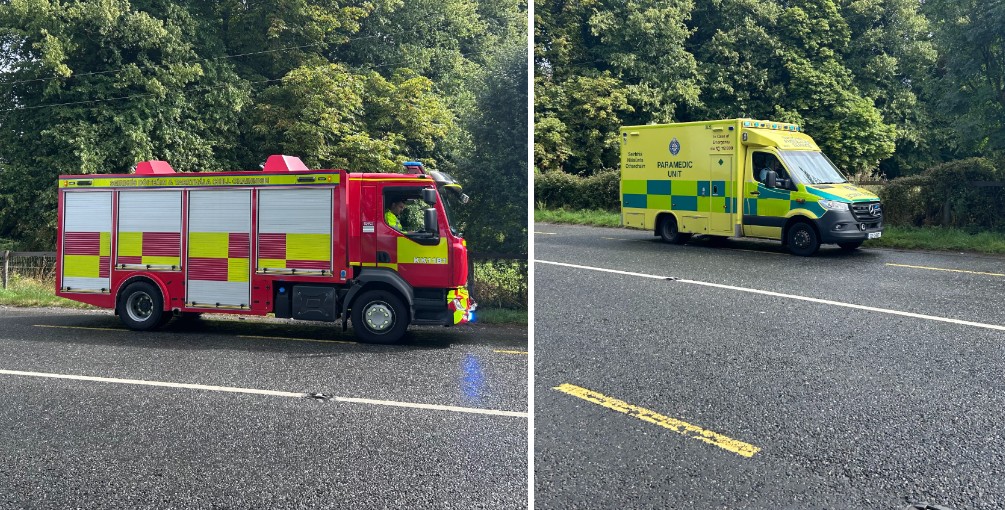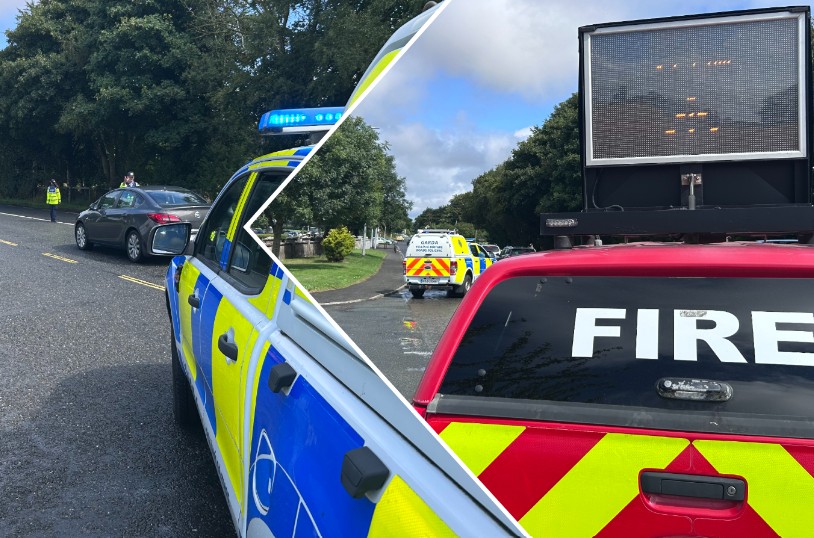
Divisional Roads Policing Inspector Paul Donohoe pictured at a high visibility checkpoint in Foulkstown earlier as gardaí launch latest phase of 'Operation Lifesaver'
Gardaí in Kilkenny launched the latest phase of 'Operation Lifesaver' this morning with a high visibility checkpoint at Foulkstown on the outskirts of Kilkenny City - ahead of what promises to be a busy Bank Holiday Weekend.
Divisional Roads Policing Inspector Paul Donohoe was joined at the checkpoint by nine members of An Garda Síochána (including trainee gardaí), as well as representatives from the National Ambulance Service and Fire Service.
Inspector Donohoe explained the 'importance' of showing drivers all the different types of personnel that are called into action following collisions.
READ NEXT: Two injured in separate assaults just hours apart in Kilkenny

"As a nation we need to wake up," he told Kilkenny Live.
"People always seem to be in a rush and speeding from place to place, putting lives potentially at risk, with speed being the biggest contributing factor to collisions."
As part of Operation Lifesaver, gardaí will be conducting additional checkpoints and patrols in Kilkenny over the upcoming August Bank Holiday Weekend.
Many people in Kilkenny are expected to attend events such as All Together Now in Portlaw in County Waterford over the weekend and gardaí are urging them to drive responsibly, and to ensure they are not driving under the influence of any drink/drugs.
Inspector Donohoe stated that the day began with a tragic start, with news of a fatal road traffic collision near Bunmahon in County Waterford overnight.
Gardaí are trying their best with the resources they have to work towards Vision Zero.
Vision Zero is a key part of Ireland's Road Safety Strategy, with the goal of reducing road deaths and serious injuries by 50% by 2030 and achieving zero fatalities and serious injuries by 2050.
DON'T MISS: Huge twist in plans for new Tesco development in Kilkenny
This involves gardaí working with the Road Safety Authority (RSA) to promote road safety and reduce traffic accidents and involves various initiatives, including enforcing traffic laws, promoting safe driving practices, and raising public awareness about road safety.
For Inspector Donohoe, the message over the Bank Holiday, as well as after it is clear: "Drive responsibly. Save lives."

He stressed that forensic collision investigators conduct detailed and thorough investigations following collisions and they will know, for example, if you were using a mobile phone prior to being involved in a collision.
"Don't be selfish and put others at risk," he said.
READ NEXT: New speed limit proposed on 'lethal' road in Kilkenny amid public outrage
COMMON OFFENCES
The four offences which contribute most to road traffic collisions as are namely:
1) Non-wearing of seat belts
2) Driving under the influence of drink / drugs
3) Speeding
4) Holding a mobile phone while driving
Seat Belts
Seat belts are the most basic form of road safety and are proven lifesavers. Seat belts dramatically reduce the risk of death and serious injury in the event of a collision. Yet garda provisional statistics from 2021 shows that 27% of drivers and passengers killed in road traffic collisions were not wearing a seat belt at the time of the crash.
Results from a recent survey found that while 96% of drivers say they always wear a seat belt, this figure drops to 83% when people are travelling in the back seat of a car. Forgetting to put on seat belt is the main reason for not wearing it.
If you are over 17 you are legally responsible for wearing your seat belt in a vehicle whether you are a driver or a passenger. Responsibility lies with the driver to ensure that all passengers under the age of 17 wear a seat belt or have a proper child restraint.
Child Restraints
All children under 150cms in height or 36kgs (79lbs) in weight must use a child restraint system (CRS) suitable for their height and weight while travelling in a car or goods vehicle.
An example of a CRS would be a child car seat or booster cushion.
Rear-facing child car seats must not be used in passenger seats protected by an active frontal airbag. An airbag which deploys in front of a rearward facing child car seat can cause serious injury or even death if there is a collision.
There is no law against children sitting in the front seat, as long as they are using the right child restraint for their height and weight.
A properly fitted child restraint system keeps the child in their seat, preventing them from being thrown about inside or being thrown from the vehicle. It also absorbs some of the impact force.
This means that your child is much less likely to be killed or injured in a collision.
DUI
Driving while intoxicated continues to be a problem on Irish roads. Gardaí would appeal to people to:
- Never, ever drink / drug drive
- Book a taxi or use public transport
- Nominate a ‘designated driver’
- Make sure you are alcohol free the next morning
With the introduction of the new drug testing device, gardaí expect the number of road side drug tests to greatly increase.
Gardaí will also continue to test people for the presence of alcohol on the roadside.
Speed
Speeding is the biggest contributing factor to road deaths in Ireland - a factor in one third of all fatal collisions.
The higher the speed, the greater the likelihood of a collision happening. Gardaí are asking people to slow down and always drive within the speed limits.
Holding Mobile Phones
Mobile phones are the number one distraction to drivers on Irish roads.
Despite the fact that using mobile phones while driving is killing people on our roads, people continue to text, make phone calls, take selfies or update their social media pages while driving.
Statistics show that making a call makes a driver four times more likely to be involved in a collision and texting makes a driver 23 times more likely to be involved in a collision.
Subscribe or register today to discover more from DonegalLive.ie
Buy the e-paper of the Donegal Democrat, Donegal People's Press, Donegal Post and Inish Times here for instant access to Donegal's premier news titles.
Keep up with the latest news from Donegal with our daily newsletter featuring the most important stories of the day delivered to your inbox every evening at 5pm.